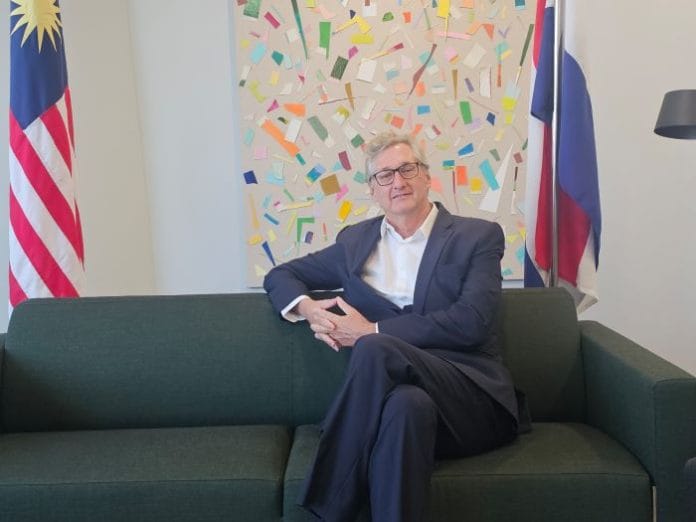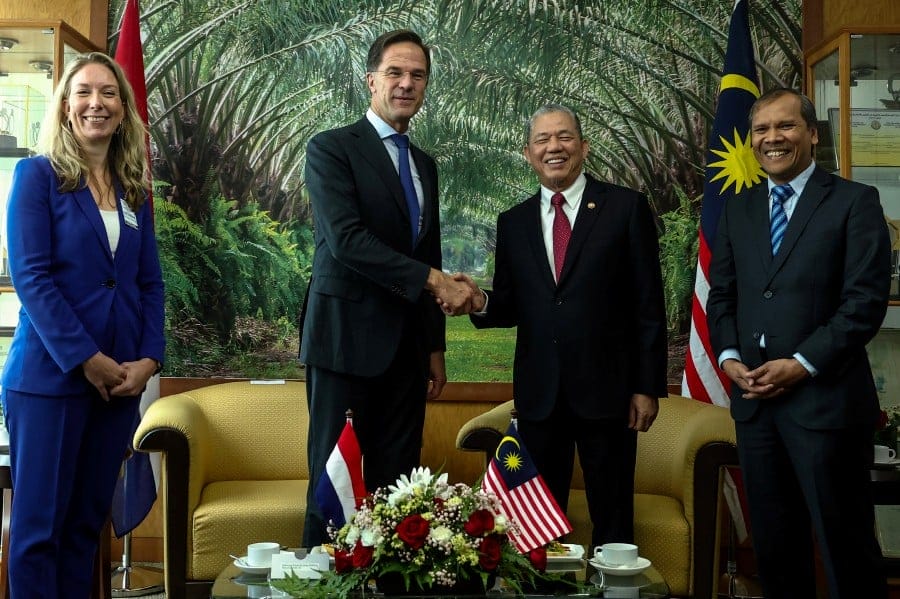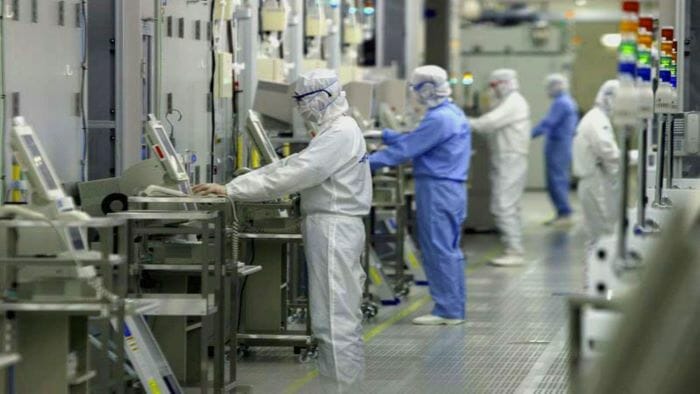Netherlands is Malaysia’s biggest trading partner in the European Union, in 2022 the Netherlands was Malaysia’s 14th largest trading partner globally and the largest among the European Union’s Member States, with total trade amounting to RM48.04 billion (USD10.93 billion); an increase of 33.4 percent, compared to RM36.01 billion (USD8.68 billion) in 2021. Moreover, in 2022, the Netherlands was also the largest palm oil importer among the EU countries, with the volume amounted to 732,324.54 tonnes.
It is with great anticipation that Malaysian hopes Netherlands will continue to increase its palm oil imports from Malaysia and support Malaysia’s endeavours in promoting sustainable palm oil production, and in scrapping negative allegations against palm oil. These are some of the issues that require resolution if Malaysia ever want to break into Europe and have its exports expand further into other nations within the European Union. Thankfully we have a very dependable ally in the Netherlands who have helped bring our case to the highest table and looked for solutions to remove some of the blocks and barrier.
BusinessToday caught up with Dutch Ambassador The Honourable Jacques Werner for an exclusive interview to discuss on issues related to trade, big exports, the future of this wonderful relationship and the EU.
The Dutch link with Malaysia goes back to the 1500s, probably this could be a reason why both nations get along so well, and we are constantly reminded of our links when we head down to the historical sites in Melaka.
Having just taken office in 2022, Werner was quick to settle in and was comfortable with what Malaysia had to offer, he had also visited Malaysia before when he was a student so a sense of familiarity, eased the ambassador to life in this tropical nation. Being placed as ambassador across the region, especially in Southeast Asia, we wanted to know more about Werner’s perspective about Malaysia and how his timely arrival coinciding with the formation of the Unity Government was viewed by the embassy.
Ever cordial, the ambassador alluded on the fact that despite change of governments, the Netherlands have had strong bilateral ties with Malaysia and both have maintained good relationship over the years, linked through modern trade, cultural exchange and technology sharing. Werner said he foresees the relationship only strengthening with the current unity government, “I foresee our relationship to strengthen even further. Malaysia is an attractive investment destination for Dutch companies due to the ease of doing business coupled with political stability” he said.
The good relationship was confirmed during the visit of the Prime Minister of Netherlands Mark Rutte, and his bilateral consultation with PM Anwar. The visit also signalled the importance of Malaysia as a strong partner for cooperation as a gateway to the ASEAN region.
Being a strong export of valuable high quality good, Malaysian has close cooperation with the Netherlands in multiple areas like agrifood, semiconductor and high-tech and water management.
The comfortable relationship could possibly hark back to our mutual historical ties, which have facilitated trade relations between the two countries with ease. The Netherlands has been the largest trade partner for Malaysia within the European Union and look to continue working on different sectors such as water, ports and logistics.
Werner says both nations are similar as both are maritime countries and strongly focussed on international trade. Both are gateways to their respective hinterlands – Netherlands as a gateway to Europe and Malaysia as a gateway to the ASEAN region.
While both also share values and priorities that align with trade objectives, such as a focus on sustainability, innovation, or technology, a consistent dialogue and open communication channels between both governments has contributed to the success of sustaining good trade relations with Malaysia.
Notably the EU and Malaysia signed a Partnership and Cooperation Agreement (EU-MY PCA) in December 2022. The PCA provides an overarching framework that aims to strengthen bilateral cooperation, particularly in the areas of trade and investment, finance, and energy.
Improving Trade Relations
On trade relations and how we can move forward Werner said “In the past 30 years the Netherlands has managed to maintain its position as an important trading hub globally. In 2021, we contributed to 3.2% to global goods imports making us the eighth largest importer of goods worldwide. I do not foresee a major change in our demand for global goods. Particularly from Malaysia, there has been a consistency of exports to the Netherlands in the past decade.”
“However, as a small and open trading nation, we are not immune from geopolitical shocks. For instance the war in Europe which led to supply chain disruptions and inflation has had an impact on the Netherlands trade flows with specific countries.” he added.
“I cannot think of any sector that doesn’t use chips; whether it’s car, wind mills, agricultural technology or to control our ports.”
He said Malaysia plays a key role in the global chip manufacturing supply chain, holding 7 per cent of global market share.
Over the past 50 years, the E&E sector specifically in Penang has grown organically, and by now there is an entire ecosystem for high tech and semiconductors in Malaysia.
This also attracts Dutch companies that are looking to diversify their supply chain due to disruptions during COVID and geopolitical tensions. Malaysia has the right skilled staff, provides an attractive investment opportunity and the nearness of suppliers and customers.
Malaysia currently has an established presence in chip assembly, packaging and testing, and plans to expand its presence in activities like integrated circuit design and wafer fabrication. There is also has plans to move up value chain in the semicon sector. Interested to establish b2b cooperation through joint ventures. Strategic partnerships in OEM and ODM, subcontracting for Dutch companies. There are about 12 Dutch Semicon companies in Malaysia.
Other areas Malaysia can explore is the new economy related to energy, currently renewable energy has become a crucial part of the green energy transition in Europe. Under the European Green Deal, 45% of energy generated in the EU must be sustainable by 2030. To achieve this the Netherlands has increased its imports on key end products and product components for the green transition (referred to as transition goods). Among these are sustainable biofuels.
Incidentally Malaysia is listed as a top 10 exporter of biofuels to the Netherlands. In 2022, the Netherlands imported a total of €8.4 billion worth of liquid biofuels of which € 390 million originated from Malaysia. Werner said this could be a potential area for Malaysian to further boosts its exports.
He noted that Sarawak which has high sources of renewable energy and hydrogen production has shown interest to work more closely with the European Union to revolutionise the energy production sector. Noting that there is much to explore in terms of technology development in these areas.
What Can Be Done More To Encourage Trade?
While Malaysia’s trade with European nations is inching up, there seem to be blocks or barriers that is preventing companies from fully exploring opportunities in Europe. Noted that the EU has strong trade policies and import laws, but could there be a middle ground where some negotiations be conducted to assist exporters leeway before they are caught off guard?
The Dutch ambassador highlighted the best way to open trade more effectively is to reduce or eliminate tariffs, quotas, and other trade barriers which can then facilitate smoother trade relations. For example he said the Malaysian government should look to reopen the negotiations on a Malaysia-EU Free Trade Agreement. The Malaysia-EU FTA (MEUFTA) negotiation had reached an impasse in 2012. However this has been rekindled by Prime Minister Datuk Seri Anwar Ibrahim’s during his latest visit to Germany where he announced the revisit to the EU-FTA.
Werner also noted that apart from trade barriers by creating an attractive investment environment through stable legal frameworks, business friendly policies, and transparent regulatory processes can also boost foreign direct investment (FDI) and stimulate economic growth.
Under the Unity Government, Malaysia has become a pro business nation with the PM calling for all his administration team to support investment and cut red tapes in making business more friendlier. Werner supports the move by Anwar and acknowledged Malaysia hon its very friendly tax policies and incentives for foreign companies which is amongst reasons why Malaysia is on the 12th place in World Bank of ease of doing business index.
He noted that this was one of the reasons why Dutch companies wants to come to Malaysia, have set-up their business here and want to extend facilities.
The encouraging support from the government together with customised incentives make it easier to work together closely said Werner. Adding that, it’s also important to have transparent regulatory framework, clear laws and policies, and consistent implementation of those policies.
Our second part of the interview will touch on the European Union which Netherlands play an important role, palm oil export, China, Trump and can Malaysia seriously break into the EU?











